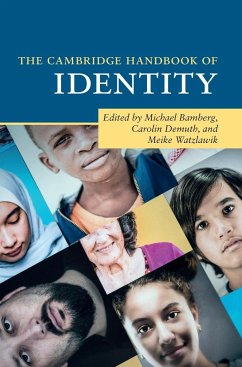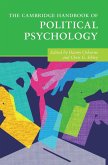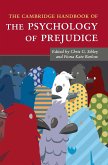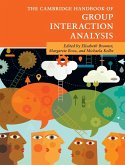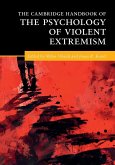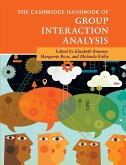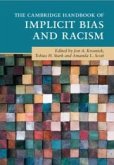The Cambridge Handbook of Identity
Herausgeber: Bamberg, Michael; Watzlawik, Meike; Demuth, Carolin
The Cambridge Handbook of Identity
Herausgeber: Bamberg, Michael; Watzlawik, Meike; Demuth, Carolin
- Gebundenes Buch
- Merkliste
- Auf die Merkliste
- Bewerten Bewerten
- Teilen
- Produkt teilen
- Produkterinnerung
- Produkterinnerung
This book theorizes identity on key themes, explores their methodological implications, and provides examples from several applied domains.
Andere Kunden interessierten sich auch für
![The Cambridge Handbook of Political Psychology The Cambridge Handbook of Political Psychology]() The Cambridge Handbook of Political Psychology182,99 €
The Cambridge Handbook of Political Psychology182,99 €![The Cambridge Handbook of the Psychology of Violent Extremism The Cambridge Handbook of the Psychology of Violent Extremism]() The Cambridge Handbook of the Psychology of Violent Extremism148,99 €
The Cambridge Handbook of the Psychology of Violent Extremism148,99 €![The Cambridge Handbook of the Psychology of Prejudice The Cambridge Handbook of the Psychology of Prejudice]() The Cambridge Handbook of the Psychology of Prejudice200,99 €
The Cambridge Handbook of the Psychology of Prejudice200,99 €![The Cambridge Handbook of Group Interaction Analysis The Cambridge Handbook of Group Interaction Analysis]() The Cambridge Handbook of Group Interaction Analysis200,99 €
The Cambridge Handbook of Group Interaction Analysis200,99 €![The Cambridge Handbook of the Psychology of Violent Extremism The Cambridge Handbook of the Psychology of Violent Extremism]() The Cambridge Handbook of the Psychology of Violent Extremism70,99 €
The Cambridge Handbook of the Psychology of Violent Extremism70,99 €![The Cambridge Handbook of Group Interaction Analysis The Cambridge Handbook of Group Interaction Analysis]() The Cambridge Handbook of Group Interaction Analysis69,99 €
The Cambridge Handbook of Group Interaction Analysis69,99 €![The Cambridge Handbook of Implicit Bias and Racism The Cambridge Handbook of Implicit Bias and Racism]() The Cambridge Handbook of Implicit Bias and Racism172,99 €
The Cambridge Handbook of Implicit Bias and Racism172,99 €-
-
-
This book theorizes identity on key themes, explores their methodological implications, and provides examples from several applied domains.
Produktdetails
- Produktdetails
- Verlag: Cambridge University Press
- Seitenzahl: 670
- Erscheinungstermin: 14. Oktober 2021
- Englisch
- Abmessung: 250mm x 175mm x 40mm
- Gewicht: 1317g
- ISBN-13: 9781108485012
- ISBN-10: 1108485014
- Artikelnr.: 61496979
- Herstellerkennzeichnung
- Libri GmbH
- Europaallee 1
- 36244 Bad Hersfeld
- gpsr@libri.de
- Verlag: Cambridge University Press
- Seitenzahl: 670
- Erscheinungstermin: 14. Oktober 2021
- Englisch
- Abmessung: 250mm x 175mm x 40mm
- Gewicht: 1317g
- ISBN-13: 9781108485012
- ISBN-10: 1108485014
- Artikelnr.: 61496979
- Herstellerkennzeichnung
- Libri GmbH
- Europaallee 1
- 36244 Bad Hersfeld
- gpsr@libri.de
1. Identity - with or without you? Perspectives and choices guiding this
handbook Meike Watzlawik, Carolin Demuth and Michael Bamberg; Part I. The
origin and development of the concept of identity: 2. Decentering histories
of identity Michael Bamberg and Martin Dege; 3. Challenges in research on
self-identity Sue Widdicombe and Cristina Marinho; 4. The mystery of
identity: fundamental questions, elusive answers Mark Freeman; Part II. New
perspectives and challenges: 5. A moral perspective: Identity as
self-interpretation Svend Brinkmann; 6. Researching identities as affective
discursive practices Octavia Calder-Dawe and Maree Martinussen; 7. The
negotiation of continuity and change of Mapuche women weavers in Chile and
its implication for (non-eurocentric) identity research Ramiro Gonzalez
Rial and Danilo Silva Guimarães; 8. Identity and voices - a language
dialogical take Marie-Cécile Bertau; 9. Psychoanalytic perspectives on
identity: From ego to life narrative Tilmann Habermas and Nina Kemper; 10.
Erikson, the identity statuses and beyond Jane Kroger and James E. Marcia;
Part III. Methodological approaches: 11. A narrative practice approach to
identities: Small stories and positioning analysis in digital contexts
Korna Giaxoglou and Alexandra Georgakopoulou; 12. Conversation analysis and
ethnomethodology: Identity at stake in a kinship carers' support group
Julie Wilkes and Susan A. Speer; 13. Foucauldian-informed discourse
analysis Sarah Riley, Martine Robson and Adrienne Evans; 14. A methodology
to examine identity: Multimodal (inter)action analysis Sigrid Norris and
Tui Matelau-Doherty; 15. Autoethnography Keith Berry; 16. A sociocultural
approach to identity through diary studies Tania Zittoun and Alex
Gillespie; 17. Positioning microanalysis: A method for the study of
dynamics in the dialogical self and identity Tania Zittoun and Alex
Gillespie; 18. Synthesized or confused field? A Critical analysis of the
state-of-the-art in identity status research methods Oana Negru-Subtirica
and Theo Klimstra; 19. Criminals' narrative identity Donna Youngs, David
Rowlands and David Cante; 20. Experimentation within the social identity
approach: History, highlights, and hurdles Lucas B. Mazur; Part IV.Current
domains: 21. Clinical psychology: Autistic identities Alessandra Fasulo;
22. Gerontopsychology: Dementia and identity Lars-Christer Hydén; 23. The
study of identity in health psychology Abigail Locke and Jane Montague; 24.
Identity scholarship in educational psychology: Towards a complex dynamic
systems perspective Avi Kaplan, Hanoch Flum, Ishwar Bridgelal and Joanna K.
Garner; 25. Political psychology: Identity development in a traumatic
environment David Becker; 26. Organisational psychology: When, why and how
is identity work (less) important in organisational life? Stefan
Sveningsson, Susann Gjerde and Mats Alvesson; 27. Conceptualizing the
multiple levels of identity and intersectionality Leoandra Onnie Rogers and
Moin Syed; Part V. Conclusion: 28. Where is identity? Reflections on
identity conceptualizations, dimensions, and implications Carolin Demuth
and Meike Watzlawik.
handbook Meike Watzlawik, Carolin Demuth and Michael Bamberg; Part I. The
origin and development of the concept of identity: 2. Decentering histories
of identity Michael Bamberg and Martin Dege; 3. Challenges in research on
self-identity Sue Widdicombe and Cristina Marinho; 4. The mystery of
identity: fundamental questions, elusive answers Mark Freeman; Part II. New
perspectives and challenges: 5. A moral perspective: Identity as
self-interpretation Svend Brinkmann; 6. Researching identities as affective
discursive practices Octavia Calder-Dawe and Maree Martinussen; 7. The
negotiation of continuity and change of Mapuche women weavers in Chile and
its implication for (non-eurocentric) identity research Ramiro Gonzalez
Rial and Danilo Silva Guimarães; 8. Identity and voices - a language
dialogical take Marie-Cécile Bertau; 9. Psychoanalytic perspectives on
identity: From ego to life narrative Tilmann Habermas and Nina Kemper; 10.
Erikson, the identity statuses and beyond Jane Kroger and James E. Marcia;
Part III. Methodological approaches: 11. A narrative practice approach to
identities: Small stories and positioning analysis in digital contexts
Korna Giaxoglou and Alexandra Georgakopoulou; 12. Conversation analysis and
ethnomethodology: Identity at stake in a kinship carers' support group
Julie Wilkes and Susan A. Speer; 13. Foucauldian-informed discourse
analysis Sarah Riley, Martine Robson and Adrienne Evans; 14. A methodology
to examine identity: Multimodal (inter)action analysis Sigrid Norris and
Tui Matelau-Doherty; 15. Autoethnography Keith Berry; 16. A sociocultural
approach to identity through diary studies Tania Zittoun and Alex
Gillespie; 17. Positioning microanalysis: A method for the study of
dynamics in the dialogical self and identity Tania Zittoun and Alex
Gillespie; 18. Synthesized or confused field? A Critical analysis of the
state-of-the-art in identity status research methods Oana Negru-Subtirica
and Theo Klimstra; 19. Criminals' narrative identity Donna Youngs, David
Rowlands and David Cante; 20. Experimentation within the social identity
approach: History, highlights, and hurdles Lucas B. Mazur; Part IV.Current
domains: 21. Clinical psychology: Autistic identities Alessandra Fasulo;
22. Gerontopsychology: Dementia and identity Lars-Christer Hydén; 23. The
study of identity in health psychology Abigail Locke and Jane Montague; 24.
Identity scholarship in educational psychology: Towards a complex dynamic
systems perspective Avi Kaplan, Hanoch Flum, Ishwar Bridgelal and Joanna K.
Garner; 25. Political psychology: Identity development in a traumatic
environment David Becker; 26. Organisational psychology: When, why and how
is identity work (less) important in organisational life? Stefan
Sveningsson, Susann Gjerde and Mats Alvesson; 27. Conceptualizing the
multiple levels of identity and intersectionality Leoandra Onnie Rogers and
Moin Syed; Part V. Conclusion: 28. Where is identity? Reflections on
identity conceptualizations, dimensions, and implications Carolin Demuth
and Meike Watzlawik.
1. Identity - with or without you? Perspectives and choices guiding this
handbook Meike Watzlawik, Carolin Demuth and Michael Bamberg; Part I. The
origin and development of the concept of identity: 2. Decentering histories
of identity Michael Bamberg and Martin Dege; 3. Challenges in research on
self-identity Sue Widdicombe and Cristina Marinho; 4. The mystery of
identity: fundamental questions, elusive answers Mark Freeman; Part II. New
perspectives and challenges: 5. A moral perspective: Identity as
self-interpretation Svend Brinkmann; 6. Researching identities as affective
discursive practices Octavia Calder-Dawe and Maree Martinussen; 7. The
negotiation of continuity and change of Mapuche women weavers in Chile and
its implication for (non-eurocentric) identity research Ramiro Gonzalez
Rial and Danilo Silva Guimarães; 8. Identity and voices - a language
dialogical take Marie-Cécile Bertau; 9. Psychoanalytic perspectives on
identity: From ego to life narrative Tilmann Habermas and Nina Kemper; 10.
Erikson, the identity statuses and beyond Jane Kroger and James E. Marcia;
Part III. Methodological approaches: 11. A narrative practice approach to
identities: Small stories and positioning analysis in digital contexts
Korna Giaxoglou and Alexandra Georgakopoulou; 12. Conversation analysis and
ethnomethodology: Identity at stake in a kinship carers' support group
Julie Wilkes and Susan A. Speer; 13. Foucauldian-informed discourse
analysis Sarah Riley, Martine Robson and Adrienne Evans; 14. A methodology
to examine identity: Multimodal (inter)action analysis Sigrid Norris and
Tui Matelau-Doherty; 15. Autoethnography Keith Berry; 16. A sociocultural
approach to identity through diary studies Tania Zittoun and Alex
Gillespie; 17. Positioning microanalysis: A method for the study of
dynamics in the dialogical self and identity Tania Zittoun and Alex
Gillespie; 18. Synthesized or confused field? A Critical analysis of the
state-of-the-art in identity status research methods Oana Negru-Subtirica
and Theo Klimstra; 19. Criminals' narrative identity Donna Youngs, David
Rowlands and David Cante; 20. Experimentation within the social identity
approach: History, highlights, and hurdles Lucas B. Mazur; Part IV.Current
domains: 21. Clinical psychology: Autistic identities Alessandra Fasulo;
22. Gerontopsychology: Dementia and identity Lars-Christer Hydén; 23. The
study of identity in health psychology Abigail Locke and Jane Montague; 24.
Identity scholarship in educational psychology: Towards a complex dynamic
systems perspective Avi Kaplan, Hanoch Flum, Ishwar Bridgelal and Joanna K.
Garner; 25. Political psychology: Identity development in a traumatic
environment David Becker; 26. Organisational psychology: When, why and how
is identity work (less) important in organisational life? Stefan
Sveningsson, Susann Gjerde and Mats Alvesson; 27. Conceptualizing the
multiple levels of identity and intersectionality Leoandra Onnie Rogers and
Moin Syed; Part V. Conclusion: 28. Where is identity? Reflections on
identity conceptualizations, dimensions, and implications Carolin Demuth
and Meike Watzlawik.
handbook Meike Watzlawik, Carolin Demuth and Michael Bamberg; Part I. The
origin and development of the concept of identity: 2. Decentering histories
of identity Michael Bamberg and Martin Dege; 3. Challenges in research on
self-identity Sue Widdicombe and Cristina Marinho; 4. The mystery of
identity: fundamental questions, elusive answers Mark Freeman; Part II. New
perspectives and challenges: 5. A moral perspective: Identity as
self-interpretation Svend Brinkmann; 6. Researching identities as affective
discursive practices Octavia Calder-Dawe and Maree Martinussen; 7. The
negotiation of continuity and change of Mapuche women weavers in Chile and
its implication for (non-eurocentric) identity research Ramiro Gonzalez
Rial and Danilo Silva Guimarães; 8. Identity and voices - a language
dialogical take Marie-Cécile Bertau; 9. Psychoanalytic perspectives on
identity: From ego to life narrative Tilmann Habermas and Nina Kemper; 10.
Erikson, the identity statuses and beyond Jane Kroger and James E. Marcia;
Part III. Methodological approaches: 11. A narrative practice approach to
identities: Small stories and positioning analysis in digital contexts
Korna Giaxoglou and Alexandra Georgakopoulou; 12. Conversation analysis and
ethnomethodology: Identity at stake in a kinship carers' support group
Julie Wilkes and Susan A. Speer; 13. Foucauldian-informed discourse
analysis Sarah Riley, Martine Robson and Adrienne Evans; 14. A methodology
to examine identity: Multimodal (inter)action analysis Sigrid Norris and
Tui Matelau-Doherty; 15. Autoethnography Keith Berry; 16. A sociocultural
approach to identity through diary studies Tania Zittoun and Alex
Gillespie; 17. Positioning microanalysis: A method for the study of
dynamics in the dialogical self and identity Tania Zittoun and Alex
Gillespie; 18. Synthesized or confused field? A Critical analysis of the
state-of-the-art in identity status research methods Oana Negru-Subtirica
and Theo Klimstra; 19. Criminals' narrative identity Donna Youngs, David
Rowlands and David Cante; 20. Experimentation within the social identity
approach: History, highlights, and hurdles Lucas B. Mazur; Part IV.Current
domains: 21. Clinical psychology: Autistic identities Alessandra Fasulo;
22. Gerontopsychology: Dementia and identity Lars-Christer Hydén; 23. The
study of identity in health psychology Abigail Locke and Jane Montague; 24.
Identity scholarship in educational psychology: Towards a complex dynamic
systems perspective Avi Kaplan, Hanoch Flum, Ishwar Bridgelal and Joanna K.
Garner; 25. Political psychology: Identity development in a traumatic
environment David Becker; 26. Organisational psychology: When, why and how
is identity work (less) important in organisational life? Stefan
Sveningsson, Susann Gjerde and Mats Alvesson; 27. Conceptualizing the
multiple levels of identity and intersectionality Leoandra Onnie Rogers and
Moin Syed; Part V. Conclusion: 28. Where is identity? Reflections on
identity conceptualizations, dimensions, and implications Carolin Demuth
and Meike Watzlawik.

